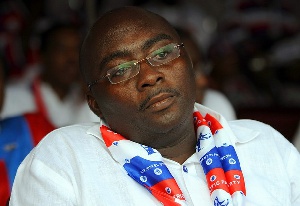Political pundit Kweku Baako Jnr says the fast depreciation of the local currency vindicates former Vice Presidential Candidate, Dr Mahamudu Bawumia.
According to him, Dr Bawumia’s warning that playing propaganda with the economy could have serious consequences has come to pass.
“After being in denial for the last couple of years, the true state of the economy is now obvious for all to see ‘fiili fiili’ as they say in my neck of the woods. The propaganda has finally given way to reality and it is not a pretty sight”, Dr Bawumia warned last year.
The cedi has already depreciated by three per cent against the major international currencies this month.
The US dollar, which sold at Ghc2.20 on the local foreign exchange market before Christmas last year, now sells at Ghc2.60.
The British pound, which sold at Ghc3 now sells at Ghc4.20.
The euro and CFA are also selling at Ghc3.50 and Ghc4.80 respectively.
In 2013, the local currency suffered 17-per cent depreciation.
The year-on-year depreciation shows a 21.96 per cent depreciation of the cedi against the dollar; 28.88 per cent against the pound sterling; 23.98 per cent against the euro and 25.54 per cent against the Swiss franc.
The Bank of Ghana recently injected $20 million into critical areas of the economy as part of efforts to shore up the cedi.
The main opposition New Patriotic Party’s 2012 vice presidential candidate said at the first Alhaji Aliu Mahama Lectures last year that: “Mr. Chairman, my concern looking at the developments in the cedi exchange rate since independence is that the cedi has been on a continuous one direction slide”, Dr Bawumia observed.
“At independence, Ghana was part of the West African Currency Board using British Pounds, shillings and pence. The exchange rate was the equivalent of 73 pesewas to the US dollar. By 1965, Dr. Kwame Nkrumah introduced the Cedi. The exchange rate at this time was ¢1.04/$. By 1983, the exchange rate was ¢52.6/$. By 1992, the exchange rate was ¢520.8/$. By 2000, the exchange rate was ¢7047/$. By 2008, the exchange rate was GH¢1.19/$ (¢11,900/$) in 2008. By October 2013, the exchange rate was GH¢2.20/$ (¢22,000/$) with all indications that it could decline further by the end of the year. At this rate, the exchange rate could be GH¢4.4/$ in another 4 years”.
According to Dr Bawumia, government’s lack of discipline in borrowing was also worsening the economic outlook.
At that lecture, the former Deputy Governor of the Bank of Ghana said: “…The rate of growth of public debt is a matter of concern. Ghana’s total public debt has increased from Ghc9.5bn in 2008 to Ghc43.9 billion as at August 2013 (an increase of 357% in less than 5 years)!”
In his view, “the NDC government has borrowed the equivalent of $20 billion in just the last five years! What is worrying is that they tell us that this is only the first gear! Can you see or feel that $20 billion dollars has been pumped into this economy in the last five years? Where are the projects to show for the $20 billion? Just imagine the transformational effect if every region were given $2 billion for development projects”.
He warned that: “With such large scale borrowing, government is crowding out the private sector which is unable to borrow to grow their business. Risk free Treasury bill rates are around 23% and bank lending rates are on the rise because of excessive government borrowing. Lending rates are now some 30 percent”.
Kweku Baako Jnr told Joy FM on Saturday that it was high time the Government listened to criticism from people of Dr Bawumia’s ilk so as not to plunge the economy into the doldrum.
General News of Saturday, 1 February 2014
Source: radioxyzonline

















